An insightful journey through Genesis 29, exploring Jacob's trials, love for Rachel, and Leah's resilience amidst deceit and hardship.
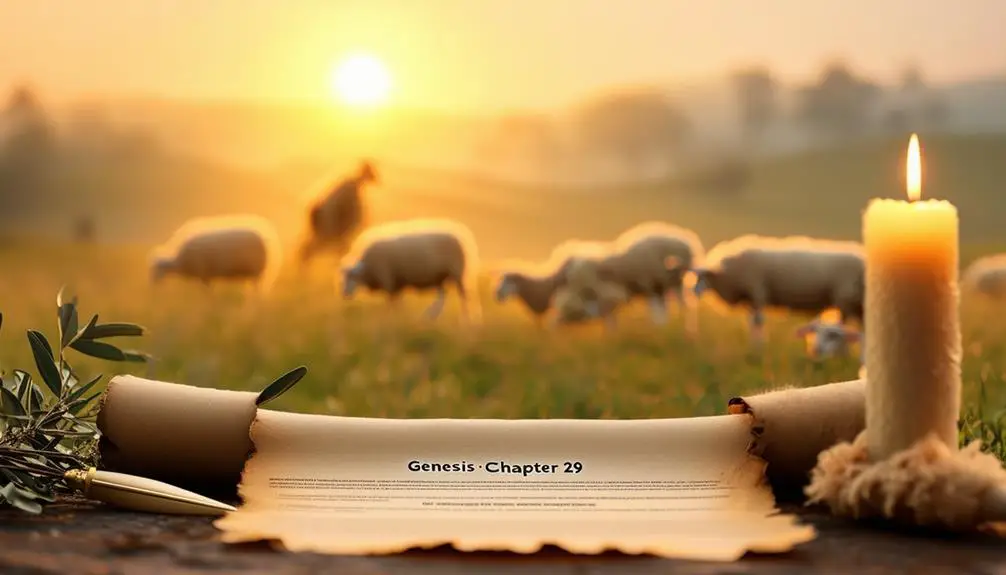
Bible Study – The Book of Genesis – Chapter 29 – Summary and Analysis
In Genesis 29, you encounter Jacob's gripping journey teeming with love, deceit, and spiritual growth. Facing Laban's trickery, Jacob unwittingly marries Leah, not his beloved Rachel, setting the stage for transformation. You observe the harsh realities of ancient shepherding and feel the intricacies of Jacob's love for Rachel. Leah's story introduces the themes of resilience and divine favor, despite human suffering. An analysis of key verses illuminates the chapter's depth, providing a deeper grasp of the scripture. As you further explore this chapter, the richness of this biblical narrative and its infinite wisdom will continue to unfold for you.
Key Takeaways
- Genesis 29 narrates Jacob's journey, his love for Rachel, and Laban's deception leading him to marry Leah first.
- Jacob's experience as a shepherd reflects the perseverance, patience, and hard work of ancient shepherd life.
- Laban's trickery serves as a turning point for Jacob, teaching him a lesson about deceit and shaping his future actions.
- The love story of Jacob and Rachel illuminates the complexities of human emotions and divine intervention in relationships.
- Leah's resilience, despite being unloved, illustrates the power of faith and the belief that one's worth is not defined by circumstances.
Chapter 29: Brief Summary
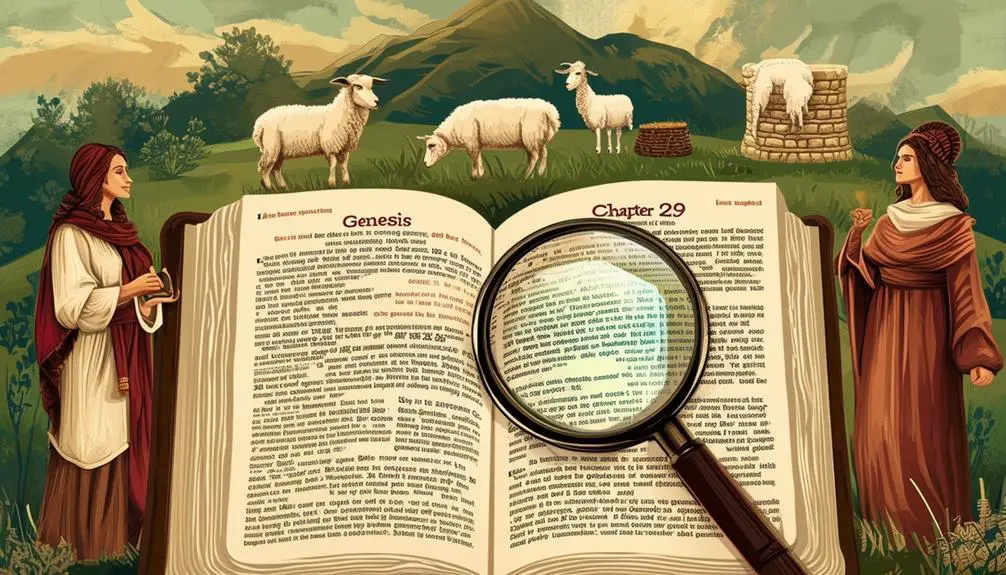
In the twenty-ninth chapter of Genesis, you'll encounter a complex narrative filled with deception, love, and rivalry, setting the stage for the profound transformation of Jacob. Laban's deception is a pivotal component of the plot, setting in motion a series of events that shape Jacob's destiny.
As you explore further into the text, you'll notice how Laban's deception becomes a catalyst for Jacob's spiritual growth. Laban tricks Jacob into marrying Leah, his elder daughter, instead of Rachel, Jacob's beloved. This deception, although painful for Jacob, serves to teach him a valuable lesson about deceit, a vice he himself was guilty of when dealing with his brother Esau.
Simultaneously, the chapter offers a detailed glimpse into the shepherd's life in ancient times. Jacob's commitment to work for Laban for seven years to win Rachel's hand portrays the rigors and hardships of a shepherd's life. It demonstrates the importance of patience, perseverance, and hard work in achieving one's goals.
The combination of Laban's deception and the shepherd's life in this chapter provides a holistic view of Jacob's journey, his trials, lessons learned, and his eventual transformation.
Analyzing Key Verses
How do key verses within Genesis Chapter 29 further illuminate the themes and motifs discussed? To comprehend the full impact of this chapter, let's explore verse significance within the biblical context.
- Genesis 29:1 – 'Then Jacob continued on his journey and came to the land of the eastern peoples.' This verse signifies the start of Jacob's journey, setting the stage for his experiences which will catalyze his personal transformation.
- Genesis 29:25 – 'When morning came, there was Leah!'. The shock and deception Jacob faces here are significant in shaping his future actions and attitudes.
- Genesis 29:32 – 'Leah became pregnant and gave birth to a son. She named him Reuben, for she said, 'It is because the Lord has seen my misery. Surely my husband will love me now.'' The desperation and loneliness Leah experiences are palpable, underscoring the human suffering prevalent in these ancient narratives.
It's important to remember that each verse has a certain depth and richness to it. By analyzing these key verses, you're not just reading the scripture, you're engaging with it, discovering its layers, and unearthing its profound wisdom. Indeed, each verse from this chapter adds another piece to the puzzle, offering a more nuanced understanding of the biblical narrative.
Jacob and Rachel's Love Story
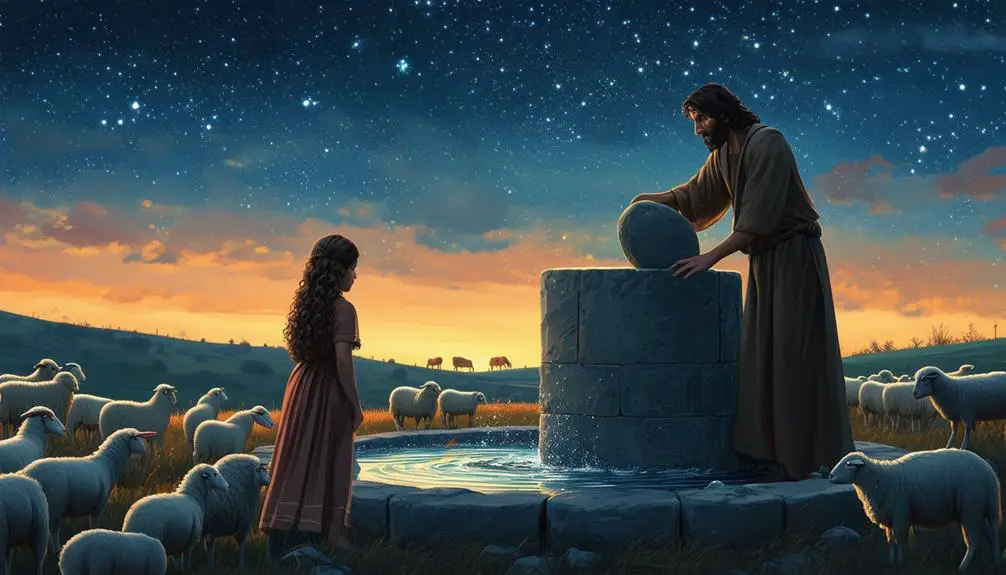
Undeniably, the narrative of Jacob and Rachel's love story, woven into Genesis Chapter 29, serves as a powerful proof to the complexities of human relationships, their emotions, and the social norms of their time. It's a tale that combines Divine Intervention with Rachel's Devotion, creating a compelling story that continues to resonate with readers today.
You'll find that Jacob's love for Rachel was immediate and profound. Yet, it led him into a complex situation, manipulated by his uncle Laban, resulting in a marriage not with Rachel, but her elder sister Leah.
Yet, Rachel's Devotion and Jacob's love did not waver, leading to a Divine Intervention. In due course, Jacob was able to marry Rachel, his true love. This story is a tribute to steadfast love, faith, and the mysterious workings of divine providence.
Aspect |
Leah |
Rachel |
|---|---|---|
Jacob's Initial Love |
No |
Yes |
Laban's Deception |
Yes |
No |
Jacob's Enduring Love |
Yes |
Yes |
Divine Intervention |
Yes |
Yes |
Rachel's Devotion |
No |
Yes |
This table aids in understanding the dynamics of the narrative, depicting the stark contrast between Leah and Rachel in Jacob's life.
Lessons From Leah's Experience
While Jacob's enduring love for Rachel paints a romantic picture, it's equally important to examine Leah's experience, a tale marked with deception and unrequited love, yet filled with remarkable resilience and faith. Leah's resilience is seen in her ability to endure the sibling rivalry and the emotional pain of being the less-loved wife.
In Leah's story, we can glean three key lessons:
- Being unloved doesn't define your worth: Leah was unloved by Jacob, but her worth wasn't tied to his love. She is remembered as an ancestress of the Israelites.
- God sees the unseen: Despite the favoritism shown to Rachel, God saw Leah's pain and blessed her with many sons, validating her position.
- Your circumstances don't dictate your resilience: Leah's circumstances were far from ideal, but she demonstrated resilience by coping with her situation and becoming a key figure in biblical history.
The tale of Leah, marked by unrequited love, deception, sibling rivalry, and eventually resilience, offers profound lessons. It's a demonstration of her faith and determination, offering the reassurance that even in the midst of adversity, one can find strength and purpose.
Interpretations and Reflections
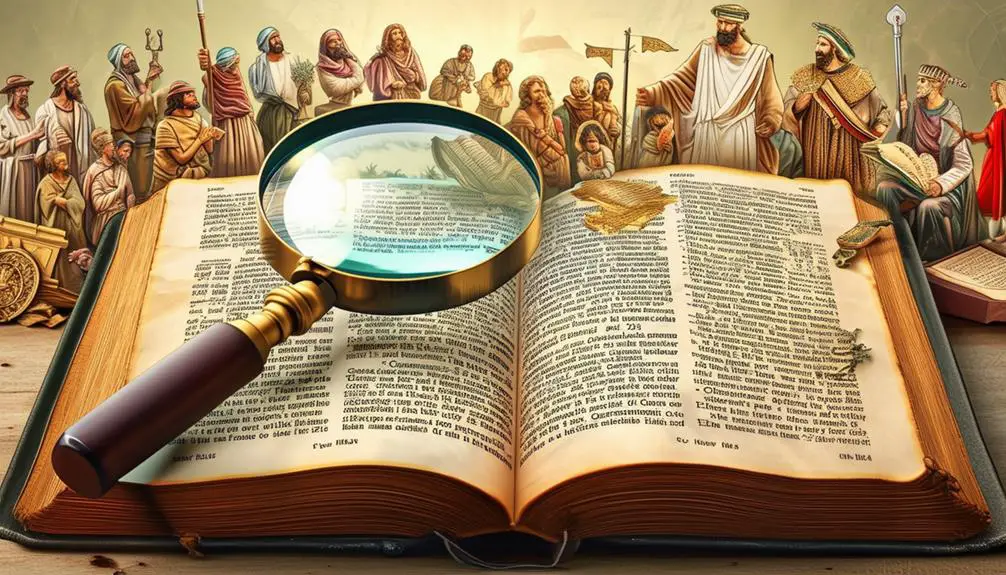
Reflecting on Leah's narrative, you'll notice it's not just a tale of sorrow and unrequited love, but also a demonstration of her unwavering faith and resilience, providing us with valuable life lessons. She is an emblem of Divine Intervention, with God opening her womb as a symbol of favor, despite human preferences. This emphasizes the theme of God's sovereignty and compassion, transcending earthly norms and biases.
The symbolic representations in the story are also remarkable. Leah's eyes, described as 'weak' or 'tender', could symbolize her vulnerability, yet her vision was firmly fixed on God. Her character embodies endurance and tenacity in unpropitious circumstances. Leah's children, too, are symbolic. Reuben, Simeon, Levi, and Judah, besides being her biological offspring, represent stages in her spiritual journey – a proof of her hope and faith.
Frequently Asked Questions
What Cultural Norms Influenced the Marriages in Genesis Chapter 29?
You're dissecting ancient norms that shaped Genesis 29's marriages. The patriarchal influence was a key driver, where men held authority and made decisions. Arranged marriages were common, often for socio-economic reasons. Love wasn't the essence, rather alliances and wealth mattered. This societal structure, deeply woven into their fabric, influenced the rules of marriage, making it a transaction rather than a union of hearts. Cultural context is vital when analyzing these practices.
Who Are the Children of Leah and Jacob?
Leah, despite not being Jacob's preferred wife, bore him six sons: Reuben, Simeon, Levi, Judah, Issachar, and Zebulun, and a daughter, Dinah. Leah's fertility played a pivotal role in shaping the lineage of the Israelites. You'll find that despite Rachel's favored status, it's Leah's offspring who form the bulk of the Twelve Tribes of Israel, underlining the significance of Leah's fertility and her role in Jacob's life.
What Significance Does Laban Play in Genesis Chapter 29?
In Genesis 29, Laban plays a significant role. He's Leah and Rachel's father, and Jacob's uncle. He influences the storyline by tricking Jacob into marrying Leah before Rachel. Laban's role serves as a catalyst in Jacob's life, affecting his future, his relationships, and ultimately the lineage of the tribes of Israel. His actions and decisions shape a large part of this chapter, demonstrating his influence on the narrative.
Are There Archeological Evidences Supporting the Events in Genesis Chapter 29?
You're asking about archaeological evidence for events in Genesis 29. While Genesis geography hints at places like Haran, precise archaeological proof is scarce. Ancient livestock practices, mentioned in Genesis, have been observed in ruins, but it's tough to connect them directly to this chapter. Remember, the Bible's primarily a spiritual guide, not a historical document. So, seeking definitive archaeological evidence might not yield the answers you're looking for.
How Is the Theme of Deception Portrayed in Genesis Chapter 29?
In Genesis 29, you'll see deception's consequences and trickery's impact vividly portrayed. Laban deceives Jacob into marrying Leah, not Rachel. This trickery leads to disharmony in Jacob's household, affecting everyone involved. The chapter serves as a cautionary tale about the ripple effects of deception, showing you that dishonesty can bring short-term gains but inevitably leads to long-term strife and complication.


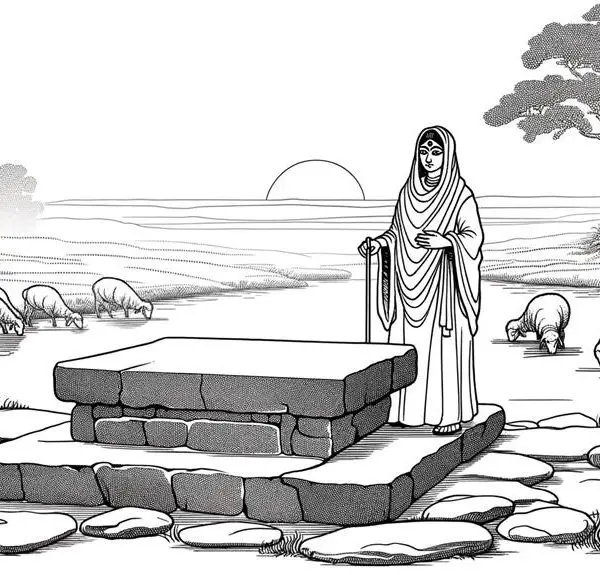
Sign up